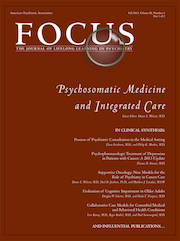Psychiatric Evaluation of Mental Capacity in the General Hospital: A Significant Teaching Opportunity
Abstract
Background
Requests for evaluation of mental capacity in general hospitals have increased in frequency.
Objective
The authors sought to determine the interventions required to respond adequately and assess the initiating circumstances.
Method
Questionnaires completed by psychiatric consultants were analyzed, and chart reviews were completed.
Results
Capacity evaluation alone resolved 32% of the requests; 31% required an evaluation plus additional interventions; 37% did not require a capacity evaluation. Patients threatening to leave against advice, and/or refusing treatments or procedures represented 64% of requests. Consultants successfully resolved 88% of such cases.
Conclusion
A mental capacity evaluation alone was insufficient to resolve two-thirds of problems eliciting requests. Consultation–liaison psychiatrists can use these evaluations as teaching opportunities.
(Reprinted with permission from Psychosomatics 2009; 50:468–473)



